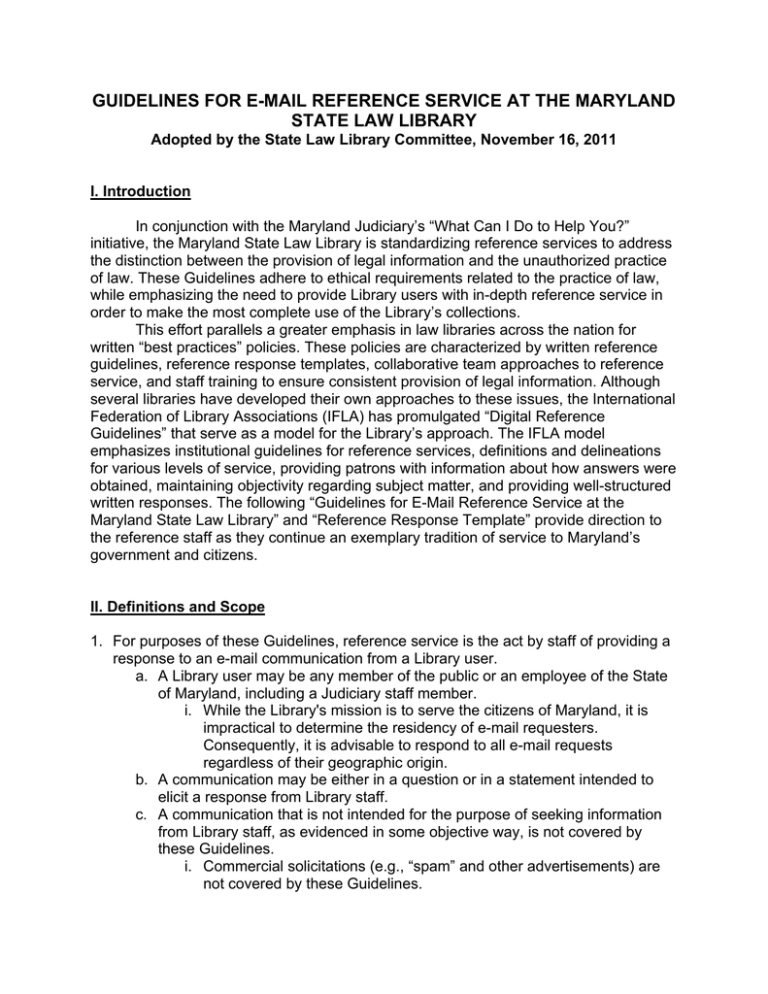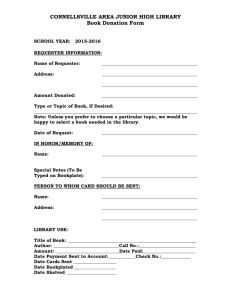Email Reference - Maryland State Law Library
advertisement

GUIDELINES FOR E-MAIL REFERENCE SERVICE AT THE MARYLAND STATE LAW LIBRARY Adopted by the State Law Library Committee, November 16, 2011 I. Introduction In conjunction with the Maryland Judiciary’s “What Can I Do to Help You?” initiative, the Maryland State Law Library is standardizing reference services to address the distinction between the provision of legal information and the unauthorized practice of law. These Guidelines adhere to ethical requirements related to the practice of law, while emphasizing the need to provide Library users with in-depth reference service in order to make the most complete use of the Library’s collections. This effort parallels a greater emphasis in law libraries across the nation for written “best practices” policies. These policies are characterized by written reference guidelines, reference response templates, collaborative team approaches to reference service, and staff training to ensure consistent provision of legal information. Although several libraries have developed their own approaches to these issues, the International Federation of Library Associations (IFLA) has promulgated “Digital Reference Guidelines” that serve as a model for the Library’s approach. The IFLA model emphasizes institutional guidelines for reference services, definitions and delineations for various levels of service, providing patrons with information about how answers were obtained, maintaining objectivity regarding subject matter, and providing well-structured written responses. The following “Guidelines for E-Mail Reference Service at the Maryland State Law Library” and “Reference Response Template” provide direction to the reference staff as they continue an exemplary tradition of service to Maryland’s government and citizens. II. Definitions and Scope 1. For purposes of these Guidelines, reference service is the act by staff of providing a response to an e-mail communication from a Library user. a. A Library user may be any member of the public or an employee of the State of Maryland, including a Judiciary staff member. i. While the Library's mission is to serve the citizens of Maryland, it is impractical to determine the residency of e-mail requesters. Consequently, it is advisable to respond to all e-mail requests regardless of their geographic origin. b. A communication may be either in a question or in a statement intended to elicit a response from Library staff. c. A communication that is not intended for the purpose of seeking information from Library staff, as evidenced in some objective way, is not covered by these Guidelines. i. Commercial solicitations (e.g., “spam” and other advertisements) are not covered by these Guidelines. ii. Communications that would be considered by an ordinary recipient to be offensive are not covered by these Guidelines. iii. A communication that is not sufficiently clear in an objective way (i.e., “gibberish,” or nonsensical phrasing) is not covered by these Guidelines. d. A communication sent by another library shall be considered to be an interlibrary loan request and is not covered by these Guidelines. 2. These Guidelines apply to e-mail reference service initiated via the Library’s primary e-mail address and the e-mail address for The People’s Law Library website. a. E-mail correspondence directed solely to a staff member’s individual e-mail address is not covered by these Guidelines. i. Staff members responding to reference requests directed solely to their individual e-mail addresses are strongly encouraged to comply with these Guidelines whenever possible. ii. Staff members should encourage Library users to communicate via the Library’s primary e-mail address when appropriate. 1. Communications of an internal nature with other Judiciary staff members or for purposes of research-related “follow-up” may be more appropriately conducted via a staff member’s individual email address. III. Evaluation of a Request Staff shall consider the content of the question by following the steps outlined below. 1. STEP ONE: Has the requester sufficiently identified the material by name or citation? a. If yes, then provide material. b. If no, then proceed to STEP TWO. 2. STEP TWO: Has the requester sufficiently identified the material by some other unambiguous description? a. To determine if a request is unambiguous, staff shall assess the feasibility of locating the requested material and consider whether the request may be subject to alternative interpretations or meanings by performing the following tasks: i. Evaluate the scope of the described material. 1. The staff member must determine whether the material can be found within a single information resource (e.g., code set). 2. The staff member must be able to identify the appropriate jurisdiction of the described material. 3. The staff member must be able to identify any temporal issues (e.g., effective dates of statutes, publication dates). 2 4. The staff member should note the requester’s usage of unrestricted terms such as “any” or “all,” which would be indicative of ambiguity. ii. Evaluate the description by attaching ordinary, reasonable and likely meanings to given terms. iii. Refrain from assigning or construing unlikely meanings or interpretations to the given terms (e.g., requester’s use of the present tense implies that the individual is seeking current, not historical, information). iv. Consider synonyms or statutory definitions for requested terms, so long as the synonyms or definitions are readily found in legal dictionaries, “Words & Phrases” or index references (e.g., “see also” entries). v. Consult an appropriate finding aid, such as a website, database, index or digest, to assess the feasibility of locating the requested material and to check the existence of alternative interpretations or meanings. b. If staff determines the request to be unambiguous, then provide material. c. If staff identifies ambiguity, then proceed to STEP THREE. 3. STEP THREE: If the request is of a general nature, then staff shall provide general information by performing the following tasks: a. Consult an appropriate finding aid, such as a website, database, index or digest, to assess the feasibility of locating the discrete part of the information resource that is most narrowly-tailored to addressing the general question (e.g., whenever appropriate or feasible, provide a subtitle of the Maryland Annotated Code, a topic heading for a West Digest, a topic section of a legal encyclopedia or a book chapter). b. Evaluate the need to remind the requester of the existence of other resources that may provide additional information on the general topic. c. Evaluate the need to instruct the requester on how to use information resources (e.g., whenever appropriate or feasible, explain finding aids, topic arrangement, authorship, publication cycles, official status or precedential value, etc.). d. Evaluate the need to instruct the requester about court procedures. e. Evaluate the need to provide the requester with referral sources. IV. Provision of Information 1. Staff shall provide a response within the following timeframes: a. For requests time-stamped as received before 2 pm, Monday through Friday, staff shall respond by 4:30 pm. b. For requests time-stamped as received after 2 pm, Monday through Friday, or any time on Saturday, Sunday or a day on which the Library is closed for a holiday or inclement weather, staff shall respond by 4:30 pm on the next business day. 3 2. Staff shall provide all requesters with one of the following types of information resources: a. Material sufficiently described by the requester, as determined in STEPS ONE or TWO, above. b. General information and related suggestions, as determined in STEP THREE, above. 3. If the material is itself unavailable to be sent or otherwise given to the requester, staff shall provide instruction on how the requester may access the material most easily and inexpensively (e.g., a referral to another library closer to the requester’s location). 4. Staff shall use, whenever appropriate or feasible, the Reference Response Template. 5. Staff shall use the "Reply with History" feature of the e-mail system. 6. Before sending a reply that contains information determined in STEPS TWO or THREE, above, staff shall consult with the Director, or the Director’s designee(s), to ensure the accuracy and quality of the reference work-product. a. While professional staff is accorded customary deference in defining and creating reference work-product, the Director, or the Director’s designee(s), shall ensure adherence to Library and Judiciary policy and the quality of services provided to Library customers. b. The Director, or the Director’s designee(s), may revise reference workproduct in any way. 7. Staff shall use the “Check Spelling” feature of the e-mail system. 8. Responses shall include the coded, internally-identifiable signatures of the author and the designated consultant (when required). 9. Staff shall not include any of the following types of statements in a reply (note that applicable Library and Judiciary policies are included in the required Reference Response Template): a. Comments that indicate that a particular piece of information applies to a requester’s stated factual scenario or case. b. Comments regarding the staff member’s assessment of a request for legal advice or a legal opinion. c. Comments that may give the appearance of bias or lack of neutrality. d. Directives of any kind (e.g., “you should,” “you’ll have to”). e. Any statement otherwise inappropriate as determined by Judiciary policy or practice. f. Hypotheticals of any kind. g. Extraneous suggestions or advice. h. Admonitions or comments based on any type of subjective interpretation of the requester’s intent. i. Misstatements or mischaracterizations of the original request. j. Inaccuracies. k. Typographical errors. 4 V. Management of Reference Requests 1. Staff shall comply with the Library’s Records Retention Schedule. a. The Library’s Records Retention and Disposal Schedule, effective July 6, 2011, requires, in Section II.11., that reference requests be destroyed one week after fulfillment of the request. 2. When feasible, the Director, or the Director’s designee(s), shall include the request and answer, without attribution, on the People’s Law Library FAQ intake page. 5 REFERENCE RESPONSE TEMPLATE Thank you for your inquiry to the Maryland State Law Library. [If there is a clear or ambiguous request for legal advice, add the following here. Otherwise, add as next to last paragraph of e-mail, before “These materials….” The Maryland State Law Library, as part of the court system, strives to maintain neutrality and fairness when assisting patrons. If you require legal advice, you may wish to consult an attorney for assistance. The People's Law Library, a legal information website maintained by the Maryland State Law Library, provides information on locating an attorney: http://www.peoples-law.org/gethelp.] I understand your question to be a need for… [Restate the type of information requested: 1. Material that is sufficiently identified by name or citation (STEP ONE) (Note that a restatement here is optional if it would be redundant.); 2. Material that is sufficiently identified by some other unambiguous description (STEP TWO); or 3. General information (STEP THREE).] I’ve checked the following widely-used legal information sources: [State the resources you used to locate the requested information, e.g., library catalogs, legal dictionaries, online databases, indexes of law books or multivolume sets, digests and/or other finding aids.] [State the keywords or legal terms you used for online searching or in finding aids, if necessary.] You may wish to review the following: [Provide the required resources whenever possible, via link or in an attachment.] [For basic, general information (STEP THREE), provide a description of the resource(s), if appropriate, e.g., “The Maryland Code contains the laws passed by the General Assembly and which are currently in force.”] [When appropriate, include: 1. Instructions on how to use the information resources 2. Information on court procedures 3. Referrals to other resources, highlighting libraries when possible.] 6 These materials may help you better understand the law. If you require additional sources, please contact lawlibrary@mdcourts.gov or call 410-260-1430 or 888-216-8156 (toll-free in Maryland). [If a customer service survey is implemented, then include: “Please help the Library improve services by completing a brief survey….”] [For e-mails containing information derived from STEPS TWO or THREE, make the appropriate consultation before sending.] 7
